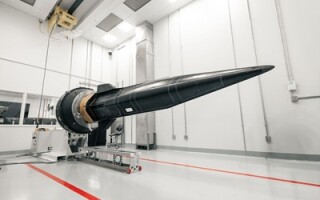OpenVPX server from Mercury offers teraflop performance for radar, EO/IR applications
NewsSeptember 26, 2014

CHELMSFORD, Mass. Mercury Systems, Inc. released a new high density server dubbed the Ensemble HDS6603 that delivers more than one Teraflop (TFLOP) of general processing power in one OpenVPX slot. This product enables cloud computing-at the tactical edge via emulation of similar but non-rugged data center capability.
By leveraging scalable server-class symmetric multiple-processing (SMP), the radar, EO/IR, and IMINT applications are can be effectively handled on the platform itself, in real-time, bringing actionable intelligence closer to the antenna and information dissemination direct to the warfighter as needed, says Ian Dunn, Vice President and General Manager of Mercury’s Embedded Products group.
The HDS6603 is powered by two 1.8 GHz Intel Xeon E5-2600 v3 processors. Each has 12 cores that deliver a total of 1.38 TFLOPS of general-purpose processing performance. Each processor has fused-multiply-add (FMA) functionality enabling common radar functions suchas fast Fourier transformations (FFTs) to be performed twice as quickly. On-board Gen 3 PCIe pipes feed the module’s switch fabric interconnects, which are managed by dual Mellanox ConnectX-3 devices to provide 40Gb/s Ethernet or InfiniBand inter-module data rates.
"Mercury’s Air Flow-By cooling technology easily dissipates the module’s heat, says Darryl McKenney, Mercury’s Vice President of Engineering Services. [The company's] micro via radial interconnect (MVRI) technology helps remove critical subsystem signal bottlenecks, enabling the fastest switch fabrics to run unrestricted at 40Gb/s and beyond, across the full rugged level-4 temperature spectrum.”
One of things unique about this chip is the ability to control power on a core-by-core basis, which enable efficient thermal management, McKenney says. Getting the heat out is a big challenge when you are talking about cloud computing, he continues. "It can't be done without the ability to extract the heat as you can’t use the inherent capabilities of the chip."
The commercial world needs efficient cooling it racking and stacking in a data centers for example, however, they don’t have added issues of shock and vibration and high-end EMI requirements that you see in military applications, McKenney explains. In other words they don’t face the thermal challenges you see in those applications – having to extract heat in a small, constrained environment with heavy shock and vibration conditions, he adds.
This is where companies like Mercury come in, McKenney says. "I look at our business as appropriating technology and leveraging it into the military market."
HDS6603 modules are designed and manufactured in the USA. Module options include air-cooled and rugged Air Flow-By deployable configurations with either InfiniBand or Ethernet data plane fabrics. For more information, visit www.mrcy.com/HDS6603 or contact Mercury at (866) 627-6951 or [email protected].





